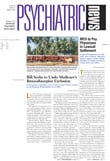Five years ago Mony de Leon, Ed.D., a professor of psychiatry at New York University, and colleagues reported that one of the first signs that a brain is succumbing to Alzheimer's is that the hippocampus metabolizes glucose less efficiently than before (Psychiatric News, September 1, 2000).
Lisa Mosconi, Ph.D., one of the research scientists working with de Leon, has now designed a test to detect early Alzheimer's that is based on that discovery. The test is called HipMask. Preliminary results suggest that the test is fairly accurate.
Traditionally, there have been two ways to analyze hippocampal glucose metabolism, Mosconi explained to Psychiatric News. One is called the regions of interest (ROI) procedure, which involves taking an MRI scan as well as a PET scan of a subject's brain and using both to extract the desired data. This process takes about four to five days per subject.
The other procedure is called voxel-based analysis and uses only a PET scan of a subject. It is quick and works well for measuring glucose metabolism in large regions of the brain, but not so well in small brain structures such as the hippocampus.
Moreover, when Mosconi and her colleagues compared the two methods in the same subjects, they sometimes found a reduction in hippocampal metabolism with the ROI procedure, but not with the voxel-based one.
They also learned that some other scientific groups had similar difficulties. So they decided that a new method for interpreting PET scan results of hippocampal glucose metabolism was needed that combines the accuracy of the ROI procedure with the speed of voxel-based analysis.
Mosconi now appears to have designed such a method—the HipMask. It takes only five minutes to extract and analyze the desired data from an already performed PET scan.
Specifically, Mosconi and her colleagues tested the HipMask on PET scans of brains of 53 older subjects whom they had already followed for 10 to 24 years and for whom they knew the outcome as far as Alzheimer's was concerned. They found that the HipMask correctly predicted a decline from normal aging to Alzheimer's with 85 percent accuracy.
“In other words, if we had 100 subjects now,” Mosconi told Psychiatric News, “we might be able to correctly predict who is going to get Alzheimer's and who is going to remain normal nine years later in 85 out of 100 cases.”
Of course, these findings need to be replicated, de Leon stressed in an interview. But “for research purposes the HipMask is ready, and we are starting a number of collaborations with groups from around the world,” he said.
Whether the HipMask procedure might also be used to diagnose Alzheimer's in its very early stages remains to be seen, he added. However, he sees it as a distinct possibility. “It could be used by any nuclear medicine specialist, neurologist, or radiologist, as the protocol is easy to use, and it would not take long to establish reference norms for a particular machine,” he said.
Mosconi presented results documenting HipMask's accuracy at the Alzheimer's Association International Conference on Prevention, held in Washington, D.C., in June. A description of the technique appeared in the June 14 Neurology.
The research was funded by the National Institutes of Health.
An abstract of “Reduced Hippocampal Metabolism in MCI and AD” is posted at<www.neurology.org/cgi/content/abstract/64/11/1860>.▪
Neurology 2005 64 1860
